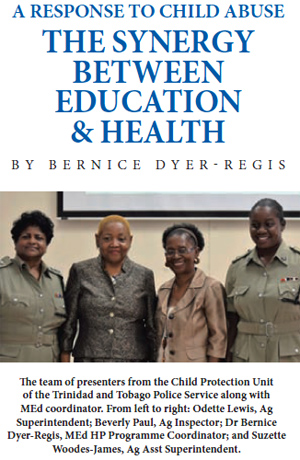
 Three senior officers from the Child Protection Unit of the Trinidad and Tobago Police Service recently conducted a seminar for the benefit of participants in the MEd Health Promotion programme and teachers enrolled in the In- Service Postgraduate Diploma in Education (Dip Ed) Programme. This signaled the beginning of collaboration between the School of Education and the Trinidad and Tobago Police Service, aimed at furthering the social wellbeing of the nation’s children. The officers who conducted the exercise were Odette Lewis, Ag Superintendent; Beverly Paul, Ag Inspector; and Suzette Woodes-James, Ag Asst Superintendent. Three senior officers from the Child Protection Unit of the Trinidad and Tobago Police Service recently conducted a seminar for the benefit of participants in the MEd Health Promotion programme and teachers enrolled in the In- Service Postgraduate Diploma in Education (Dip Ed) Programme. This signaled the beginning of collaboration between the School of Education and the Trinidad and Tobago Police Service, aimed at furthering the social wellbeing of the nation’s children. The officers who conducted the exercise were Odette Lewis, Ag Superintendent; Beverly Paul, Ag Inspector; and Suzette Woodes-James, Ag Asst Superintendent.
As an intra-departmental initiative, the seminar was organised by faculty and students of the MEd Health Promotion programme at the School of Education. With both programmes being conducted during the recent summer semester, a unique opportunity was presented to realise respective objectives.
Health Promotion subscribes to the World Health Organization’s definition of health which states that: Health is a state of complete physical, mental and social well-being and not merely the absence of disease or infirmity. In that regard the seminar created an opportunity for operationalising one of the Health Promotion strategies, that of building alliances. In so doing, the Dip Ed teachers were updated on their legal responsibilities in relation to disclosing even suspicion of sexual and physical abuse, abandonment, neglect or illtreatment of children.
The frame of reference throughout the seminar was the Children’s Act 12 of 2012 which now defines a child as being 18 years or younger. The presenters clearly established the distinction between the role and functions of the Child Protection Unit viz-a-viz that of the Children’s Authority.
They emphasised that the efforts of the Child Protection Unit (CPU) are investigative in nature while the Children’s uthority is concerned with care and protection of at-risk children or victims of abuse or neglect. Members of the CPU team outlined the criminal offences related to the Act; parental responsibility and that of others such as teachers and nurses; and the various Marriage Acts providing exceptions to children engaging in sexual activities. They highlighted new Sections of the Act like those related to powers of the court and the process that should be followed in reporting suspicion of an offence against a child. The audience was also made aware of new offences created under the Act such as child pornography, sexual touching and sexual grooming.
At the School of Education teachers are prepared to function at all levels of the education system, from Early Childhood Care and Education to the tertiary level. Therefore the School of Education intends to extend its partnership with the Child Protection Unit of the TTPS to cover its entire student base.
|





